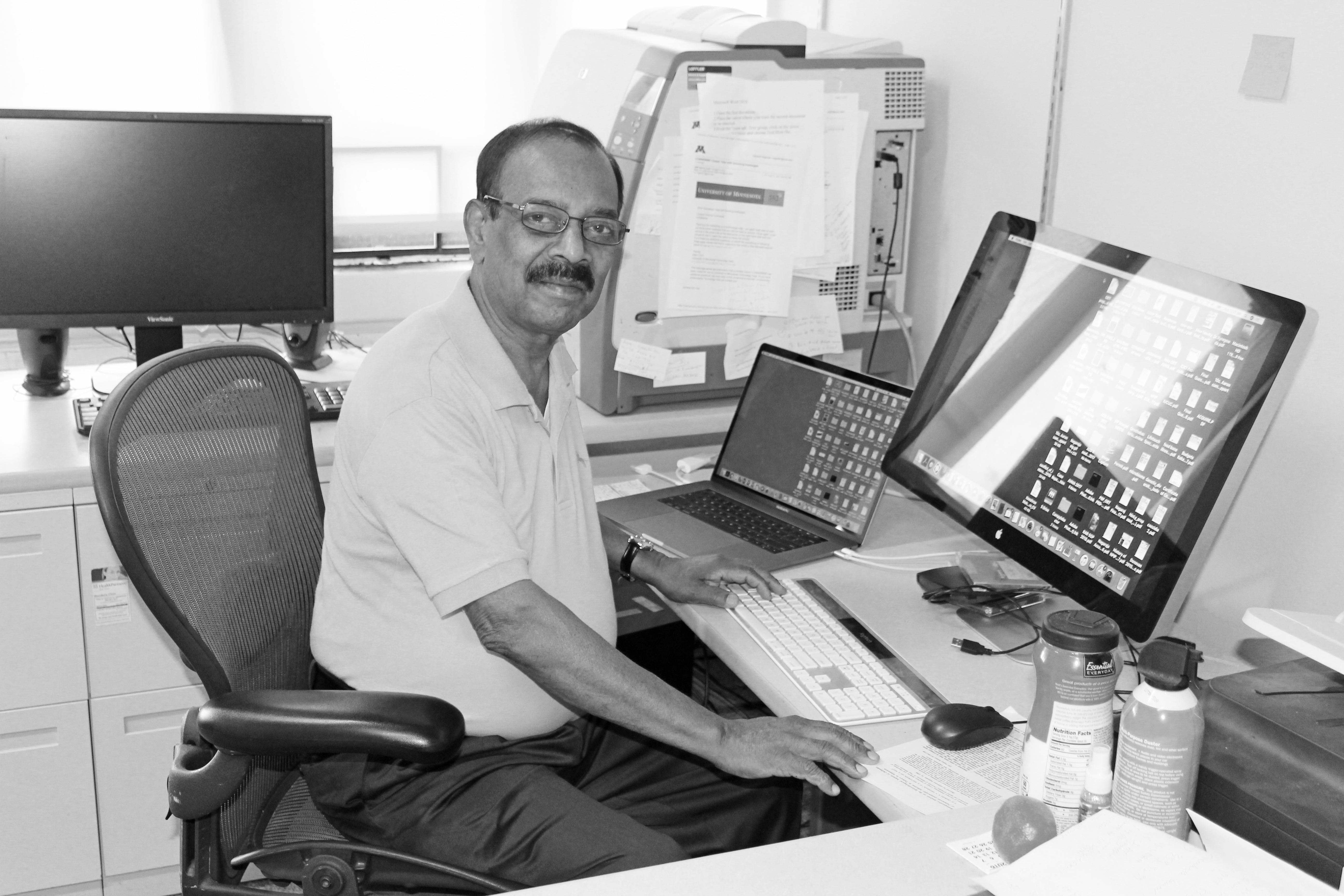BACKGROUND
Dr. Nagaraja arrived at the University of Minnesota over four decades ago, after serving as a microbiology instructor at a Mysore Veterinary College, University of Agricultural Sciences in Bangalore, India.

In 1966, Dr. Kakambi Nagaraja graduated with a veterinary degree in India and worked as a Veterinary Assistant surgeon for the State Government of Karnatka in Bangalore, India until he completed the requirements for a master’s degree in veterinary microbiology from Mysore Veterinary College in 1969. He was then appointed to teach at the same college as an instructor in the ensuing four years. In 1974, he moved to the United States and embarked on a new career path at the University of Minnesota. He still remembers his first day, September 22, 1974, which happened to be a cool day, typical of Fall semester in this region of the country. Nevertheless it was a drastic change from the weather in Bangalore, India. The climate was not the only thing different--the people were different too. It took some time to settle in, and Raj treated everyone with equal respect. With that attitude, he forged some lifelong friendships, most notably with his mentor, Dr. Ben Pomeroy, who was a constant source of support throughout his career and a role model who lives in Dr. Nagaraja’s memory to this day.
RESEARCH
Dr. Nagaraja has conducted investigations on infections produced by Salmonella, Escherichia coli, and other microbial pathogens since 1979. The Minnesota Turkey Growers have supported his research throughout his career and he has forged many alliances and partnerships. Dr. Nagaraja’s laboratory currently focuses on Clostridial infections of turkeys, and provides support in developing diagnostic reagents for pathogenic salmonellae to many poultry labs in USA.
CAREER HIGHLIGHTS
Dr. Nagaraja was the recipient of the prestigious Ranelius Award for his many contributions to turkey health from the Minnesota Turkey Growers Association in 1984. He has been recognized nationally and internationally for distinction in avian research by the American Association of Avian Pathologists, the North Central Avian Disease Conference, Asociación Nacional de Especialistas en Ciencias Avicolas de Mexico, and the National Poultry Improvement Plan Conference. He has several US patents. Raj had leadership roles in several national organizations, including the US Animal Health Association where he was Vice Chair and Chair for ten years, and served as an expert on the Salmonella Committee of the NPIP National Improvement Biannual Conferences.
INSPIRATIONS
When asked who has inspired him, Dr. Nagaraja quickly returned to his mentor, Dr. Ben Pomeroy who was Dean of the College of Veterinary Medicine as well as the Department Chair of Microbiology. Dr. Pomeroy supported Nagaraja throughout his career and his achievements. “He played an important role in what I am today,” states Raj. He has many fond memories of his mentor from learning from him, to working with him, to the final days before his passing.
ON THE FUTURE OF POULTRY RESEARCH
The poultry industry is in a phase of consolidation. There were 550 turkey growers in Minnesota when Dr. Nagaraja began his work with the industry, and today there are only four growers. The producers have turned into corporations with well-defined research interests. The University has an important role to play with these large corporations in order to move poultry research forward.
HIS GREATEST LIFE LESSON
Dr. Nagaraja has taught veterinary students about infectious diseases, has participated in the avian core teaching, lectured for undergraduate General Microbiology, and mentored many M.S. and Ph.D. students and followed their careers. What has made Raj most proud is seeing where these students have gone and made of their own careers. He gets much enjoyment from connecting with them not only as students but as peers and friends, and watching them to do the same for the young scientists they influence, i.e. paying forward what was given to them. And most importantly, supporting each other and their peers in the scientific community, because such support is what is needed in order to take achievement to the next level. ‘We rise by lifting others.’
HIS ADVICE TO FUTURE SCIENTISTS
When asked what he has learned over the years, Dr. Nagaraja replied, “Every day, I have come to the College with enthusiasm.” A positive attitude leads to positive outcomes. Raj said that he ‘treated the college as his second home.’ By nurturing friendships with peers, becoming involved in their lives, mentoring students, working together with professional colleagues, the college leadership, and several CVM deans over the past 44 years, he was able to make a life for himself and his family here, and flourish.
To learn more about Dr. Nagaraja's research, please click on the slide show, “History of Turkey Research at the University of Minnesota,” which was originally presented at the Gut Health Symposium in Willmar, MN November, 2012.
“Every day, I have come to the College with enthusiasm.” A positive attitude leads to positive outcomes.